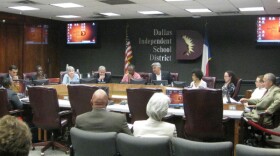More than a month ago, a committee was appointed to rewrite the Dallas school system’s charter under the controversial home-rule process. The panel has to finish that charter by mid-August to get it on the ballot this November. That seems unlikely -- and there could be consequences.
So far, the home-rule committee has met just once. A second meeting is tentatively scheduled for early next month. Attorney and former Dallas school board member Edwin Flores, one of the few home-rule supporters on the committee, worries the charter won’t be ready in time.
“There’s a sense of urgency,” Flores says. “It bothers me to the extent that the sooner we can make modifications to rules we can apply to the district to help students. Why are we delaying? We should get those opportunities and be able to move on that as fast as possible.”

The home-rule committee’s second vice-chair, Jerome Garza, is a former DISD trustee who served with Flores. Garza doesn’t want to rush the process.
“We are in the infancy stage of learning what needs to change if anything,” Garza said. “I think it’s premature to put a deadline on something without understanding what the true issues are.”
State law gives the home-rule committee up to a year to finish its work. Garza and Flores say delivering a comprehensive charter could take that long. But missing the November ballot means it probably wouldn’t be part of an election that gets the 25 percent voter turnout which state law requires. That outcome worries Mark Melton, who wants only a limited number of changes to the school charter. He’s on the board of the business-backed Educate Dallas, a nonprofit that funds school board candidates.

“If it doesn’t make the November election,” Melton says, “there is some likelihood people will go to Austin this spring and will report out to our newly elected, very conservative, very school-choice loving legislature, that an effort was made to get a home-rule charter implemented and it was stalled.”
And, Melton says, the legislature could then lift that 25 percent turnout requirement. Then he says, anyone with money could draft a new charter, pay for petition signatures and get it before a smaller number of voters. Flores says that wouldn’t be such a bad idea.
“Well, maybe turnout was higher then,” Flores says. “And now that voter turnout has dropped, then perhaps they have to revisit that number to something that takes into consideration the voters’ wishes but that also makes it even possible to get there.”
The second meeting of the home-rule committee is tentatively scheduled Aug. 4. Members will then have about two weeks from that date to finalize a charter if the item’s going to get on the fall ballot.






